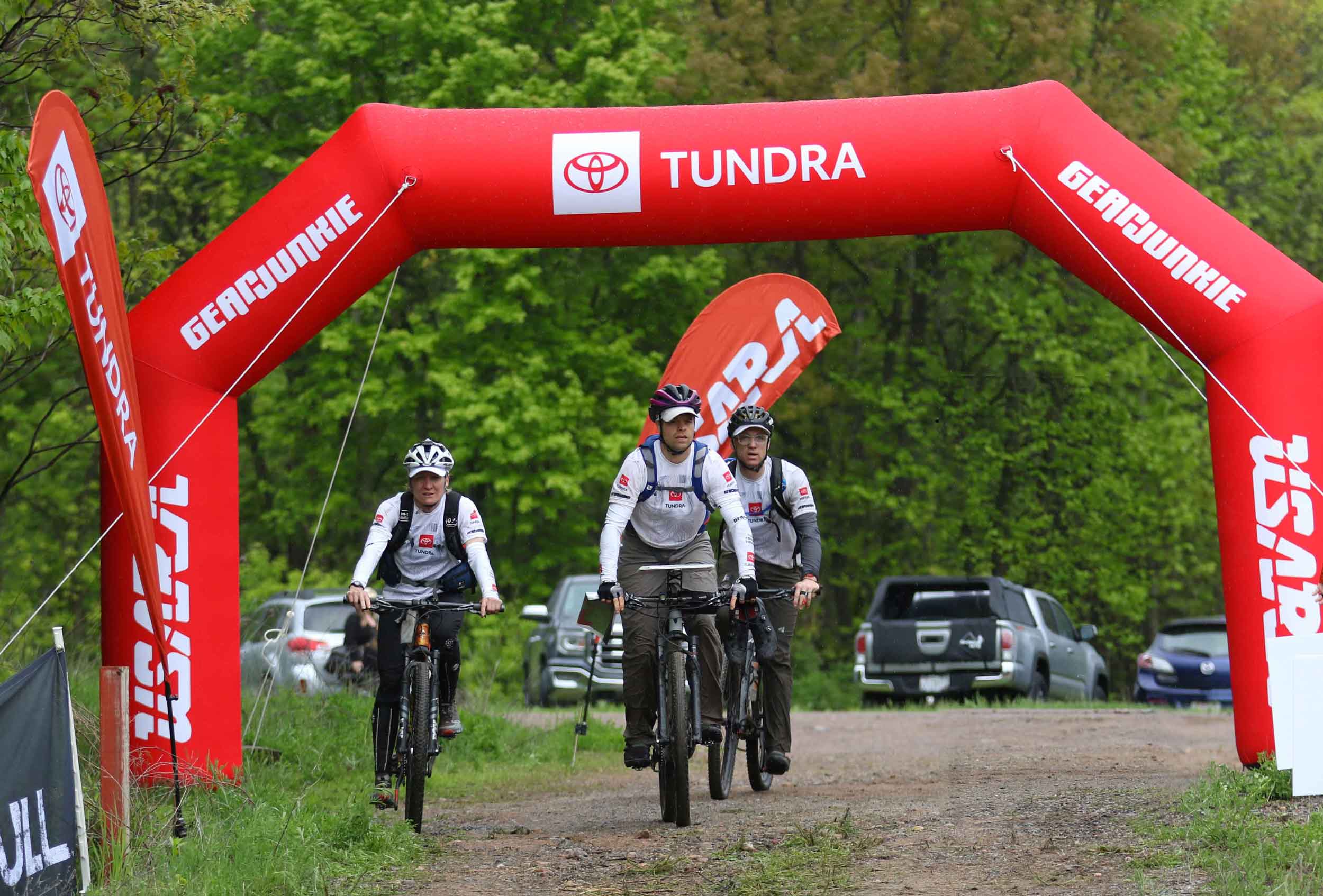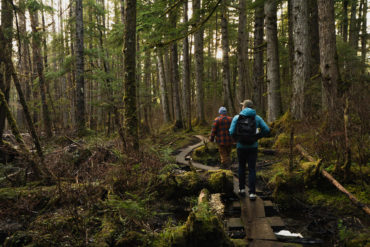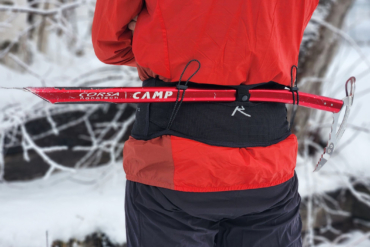For 2022, GearJunkie collaborated with Toyota to form an adventure racing team traveling to compete in events around America.
The Sierra Nevada mountain range in Eastern California will be the final stop for Team Toyota Tundra (TTT) this year. There, on Sept. 16-17, the U.S. Adventure Racing Association (USARA) hosts its annual National Championship race, an event where teams run, bike, and paddle for 30 hours nonstop.
For 2022, GearJunkie is the official media partner of the USARA, and Toyota Tundra serves as the title sponsor of the race season. Currently ranked third in the U.S. after five races this year, we caught up with the TTT squad for a summary of the season so far as well as some background on how (and why) they got involved with the sport.
Mari Chandler (46, East Tawas, MI)
What is your profession?
I am mostly a full-time adventure racer. But when not training or racing, I work on landscaping projects, contract computer work, repair, and general maintenance work.
What was your first AR?
Big Blue Adventure Race, Half Moon Bay, Calif., in 2005.

How many ARs have you participated in?
Well over 100 at this point! Anything from 2 hours to 8 days in length.
Why do you choose to focus on AR?
There’s nothing else out there that can challenge your mind, body and soul, all at the same time and all while seeing some of the most amazing places in the world.
What are your top achievements?
USARA National Champion (three times); second place in the AR World Championships (2016); third-place World Championships (2017).
What is a blunder or funny moment?
The biggest blunder was when my team and I had a 24-hour lead on the next team during a multiday expedition race, and we somehow, over the course of the days ahead, completely blew it!
But, looking back, every race usually has at least one funny moment. If it doesn’t, you’re not doing it right.
One of my favorites was when we were racing in Ecuador. We stopped to ask some locals for directions. Their dog then escorted us all the way to the next transition area. It ran ahead and literally barked at the neighborhood dogs to keep them away from us the whole way. I’ve never seen anything like it.
How do you train for AR?
I personally like to race a lot so that I don’t have to train so much. But when I train, I mix it up to keep it fun and stay healthy.
I also try and focus on what I need to do for the next race. For example, if I know a race coming up has a large amount of paddling, then I make sure I get my butt in a boat two to three times a week.
Any tips for people looking to get into the sport?
Choose fun people to race with who have similar goals. Don’t worry about the whole race; take it one piece at a time. Learn from your mistakes — don’t dwell on them. Take care of your feet. Bring a variety of food!
What are your goals for this year on TTT?
Race hard, win everything we can, race in new places, and have a blast with my team!
Justin Bakken (42, Minnetonka, MN)
What is your profession?
I’m a GIS environmental consultant.
What was your first AR?
I can’t remember the name, but I raced near Green Bay, Wisc., in the spring of 2003 with a good friend of mine. It was the first AR for both of us, and we made so many mistakes. Embrace them as learning opportunities and try not to repeat them.
How many ARs have you participated in?
I raced about 100 events from 2003 to 2011 and then stopped keeping track. I had a few years where I raced less when our kids were young, and then the pandemic hit. Probably pushing about 150 at this point.
Why do you choose to focus on AR?
I’m a team-oriented person; I played competitive soccer in college and have always appreciated a goal-oriented environment driven by supportive teammates. I love the variety of the disciplines in AR, with different lengths and changing orders. And I love the strategy and navigation required in the sport. Finally, getting out into nature and seeing cool places most people would not go.
What are your top achievements?
This may get me in trouble, but my team has never DNF’d (did not finish) a race. I’ve been racing for about 20 years, and my team has never quit a race. I feel both lucky and fortunate.
I’ve also got a few USARA National Championships under my belt, and those are accomplishments I hold in high regard, including the teamwork it took to get there.

What is a blunder or funny moment?
Last summer, for a local Minnesota race called the Pocket Gopher Challenge, I borrowed a mountain bike from my brother for a taller teammate I was racing with. One of the pedals fell off after about 5 miles, and while I was pushing my teammate up a hill about 2 miles later, the other pedal fell off as well.
My brother and/or I had managed to cross-thread both pedals on the bike. Ugh! So I pushed my teammate fully the next mile or two until we passed through a neighborhood. A garage door was open, and I spotted a bike inside. We knocked on the door and convinced the owner that it would be a good idea for him to lend us the bike and we would leave the other for collateral until that afternoon.
The bike was much too small, but we got through the course and worked our way back into second place. We arrived at the finish about 40 minutes early, but the lead team came in several minutes late, so they lost more checkpoints and we ended up winning. Never give up!
How do you train for AR?
Do whatever training you have time for. More is better, but some is better than none. Try to make it count and work on your weaknesses. If you are the team navigator, do it more — your success is the team’s efficiency.
Any tips for people looking to get into the sport?
Sign up for your first race. Then do it as much as you can after that. Find similar-minded teammates that are supportive, even when they are uncomfortable.
What are your goals for this year on TTT?
I’m both thankful and fortunate to be sponsored by Toyota Tundra this year. We obviously have high expectations for ourselves in local races and regional events. Repeating our national championship win from last year would be pretty special.
Brian Mayer (37, Blacksburg, VA)
What is your profession?
I’m a researcher.
What was your first AR?
The Blacksburg October Surprise race in 2004, a 12-hour event.
How many ARs total?
I have raced in 73 total adventure races with 45 different teammates.
What are your top achievements?
I have raced with so many different people and in lots of different places, and I look forward to more of both. I have also won multiple National Championship races.
What is a blunder or funny moment?
No race is perfect, and every time I race we make mistakes. Hopefully, you are smart enough to limit them and not make too many. For example, one time we underestimated how long a course would take and finished late. We were the only team to do the whole course, but because we finished late, we were DNF’d.
How do you train for AR?
I ride my bike to and from work, run in the woods with my dogs, run and carry my kids around the woods in a backpack, and I just wander away from my house with a map. I am fortunate to live in a national forest and next to 10,000-plus acres of public land.

Any tips for people looking to get into the sport?
The best way to learn is to do it as much as you can. Learn from successes and mistakes. Try to race with people who have more experience or different experiences. You can learn new things from everyone, even the people you don’t race well with.
What are your goals for this year on TTT?
It would be great to get first place in the USARA series and National Championship race. But mostly I want to have fun and laugh out there on the course!
This article is sponsored by Toyota. Find out more about the 2022 Toyota Tundra online.









